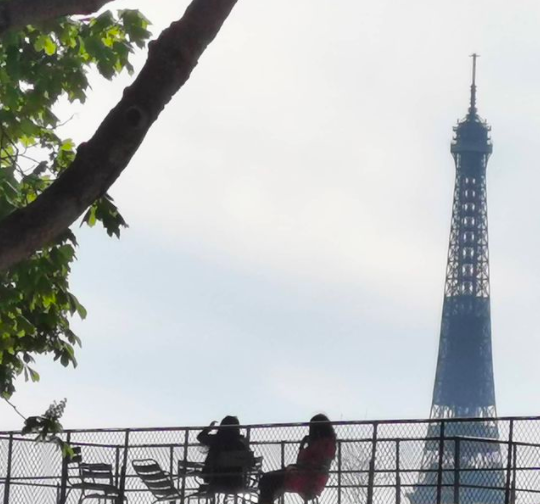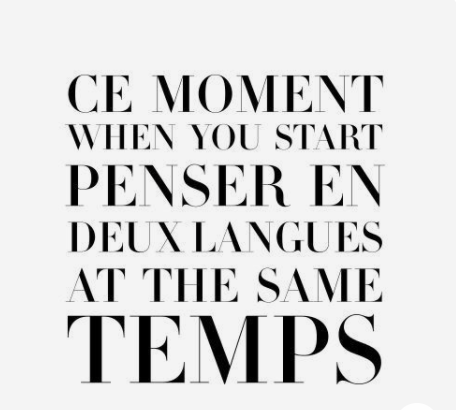le franglais: stuck between two languages
The year I taught English in Paris, my ‘franglais’ was stronger than either my English or my French.

I was using a strange kind of mixed-up hybrid language, a bilingual dilemma perfectly expressed in the saying emblazoned on T-shirts and coffee mugs:
Ce moment when you start to penser en deux langues at the same temps.”
That year, I was in the thick of having the two languages jostle against one another in my brain. It made communication difficult.
I caught myself saying things like, “Frankly, voilà the solution to your problème.” Or: “I can’t believe my students’ conneries this week!” Or even, “I’ve comported myself poorly.”
Of more and more time I speak to myself in my head, in the voice that is that of English translated very bad. I am so much surrounded by people who speak like this I no more remember the way correct. Someone proposes to me to march along the river, and in my head, I am saying, ‘I am in accordance.’ Someone proposes to me to eat of the croissant, and in my head, I am saying, ‘That walks.’ Someone proposes to me to march along the river after the eating of the croissant and I am thinking, ‘I have much too much of sleep for to do that.’ Then I bed myself.
My thoughts sounded like this.
Through my nearly complete immersion in French that year, its vocabulary and syntax were grafting themselves onto the structures of my native tongue.
The transformation was rendering my English communication calamitous.

My post-‘franglais’ days
These days, my ‘franglais’ is no longer dominant, though. As a French professor in the U.S., I live and work mostly in English. But sometimes with students or on long afternoons of research, I get to spend hours’ time exploring my mind’s French-language house. On its well-oiled hinges, the front door opens with a “Bonjour, ça va?” and ushers in each guest with the answer, “Ça va bien.” The kitchen is full of everyday French, as is the study; these two rooms brimming with familiar words – well used, comfortable, and gleaming from years of polish.
The vast library spans generations of authors, from Marie de France to Assia Djebar. Upstairs, there’s an angsty teenager’s room whose door is rarely open. There, you’ll find some dated slang and swearing – usually about the subjunctive. Leaving the adolescent’s cavern, you’ll find a corridor of other closed-off rooms, crowded with technical jargon and decades-old untouched topics like real estate, banking, and university administration.
Upstairs, at the end of the hall, there’s an empty nursery. Not even a rocking chair; for I never absorbed children’s French, that magic blend of childhood nursery rhymes, fairy tales, lullabies, friends, vacations, memories of grandparents, and the transmission of centuries of culture and complexity.

When I think in ‘franglais’, I see the world much differently than in English.
There is so rarely a one-to-one correspondence; a single word, such as “dépaysement,” can be so expressive in French but take twice as many words to explain in English. Oh, that bewildering feeling of not being in your home country! And sometimes, it’s the opposite. As a malcontented foreign sojourner in Paris, I often felt lonely. But there’s no specific word for “lonely” in French. Only seule, isolée, abandonnée, perdue.
Living in between two languages isn’t always easy, but it’s a gift in and of itself.
My French language house is a good place to spend time. These days, I know my way around with my eyes closed. But whenever I go back to France or another French-speaking country, I discover more hidden rooms… longer hallways, and brighter wallpaper colors. A shining oak floor under a threadbare carpet. A new corridor leading to an unopened wardrobe. A manoir in a process of continual construction and restoration.
I think it’s time for a rénovation domiciliaire soon.
Vive le ‘franglais’!
Do you ever speak ‘Franglais’? Do you have stories to share? Please share your experience in the comment section below.
- Jardens des Tuilleries, Paris – Copyright @ludovicmarin
- ‘franglais’ both languages together via FrenchBien
- ‘franglais’ example via Pinterest







Love this analogy of a house and its different rooms – so appropriate!